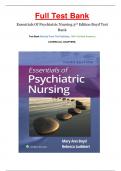Full Test Bank
Essentials Of Psychiatric Nursing 3rd Edition Boyd Test
Bank
Test Bank Directly From The Publisher, 100% Verified Answers.
COVERS ALL CHAPTERS.
, Table of Contents
Chapter 1, Mental Health And Mental Disorders
Chapter 2, Cultural And Spiritual Issues Related To Mental Health Care
Chapter 3, Patient Rights And Legal Issues
Chapter 4, Ethics, Standards, And Nursing Frameworks
Chapter 5, Theoretical Basis Of Psychiatric Nursing
Chapter 6, Biologic Foundations Of Psychiatric Nursing
Chapter 7: Recovery Framework for mental health
Chapter 8, Therapeutic Communication
Chapter 9: The Nurse--Patient Relationship
Chapter 10, The Psychiatric--Mental Health Nursing Process
Chapter 11, Psychopharmacology, Dietary Supplements, And Biologic Interventions
Chapter 12, Group Interventions
Chapter 13, Stress And Mental Health
Chapter 14, Management Of Anger, Aggression, And Violence
Chapter 15, Crisis, Loss, Grief Response, Bereavement, And Disaster Management
Chapter 16, Suicide Prevention
Chapter 17, Mental Health Care For Survivors Of Violence
Chapter 18, Anxiety Disorders
Chapter 19, Trauma- And Stressor- Related Disorders
Chapter 20, Obsessive--Compulsive And Related Disorders
Chapter 21, Depression
Chapter 22, Bipolar Disorders
Chapter 23, Schizophrenia And Related Disorders
Chapter 24, Personality And Impulse-Control Disorders
Chapter 25, Addiction And Substance-Related Disorders
Chapter 26, Eating Disorders
Chapter 27, Somatic Symptom And Related Disorders
Chapter 28, Sleep–Wake Disorders
Chapter 29, Sexual Disorders
Chapter 30, Mental Health Disorders Of Childhood And Adolescence
Chapter 31, Mental Health Disorders Of Older Adults
,Test Generator Questions,
Chapter 1, Mental Health And Mental Disorders
Multiple Choice
1. As Part Of A Class Activity, Nursing Students Are Engaged In A Small Group
Discussion About The Epidemiology Of Mental Illness. Which Statement Best
ExplainsThe Importance Of Epidemiology In Understanding The Impact Of Mental
Disorders? Epidemiology:
A) Helps Promote Understanding Of The Patterns Of Occurrence Associated
WithMental Disorders.
B) Helps Explain Research Findings About The Neurophysiology That Causes
MentalDisorders.
C) Provides A Thorough Theoretical Explanation Of Why Specific Mental
DisordersOccur.
D) Predicts When A Specific Psychiatric Client Will Recover From A Specific
MentalDisorder.
Ans: A
Chapter: 1
Client Needs: Safe, Effective Cagrr
eAedeis
nv rolna
mbe.Nc
t:Om
management Of Care
Cognitive Level: Apply
Integrated Process: Teaching/Learning
Objective: 4
Page Number: 2
Feedback: Epidemiology Is The Study Of Patterns Of Disease Distribution And
Determinants Of Health Within Populations. It Contributes To The Overall
UnderstandingOf The Mental Health Status Of Population Groups, Or Aggregates,
And It Examines TheAssociations Among Possible Factors. Epidemiology Does Not
Explain Research FindingsAbout Neurophysiology, Provide Theoretical Explanations
For Why Specific Disorders Occur, Or Predict Recovery.
2. A Nurse Is Working In A Community Mental Health Center That Provides Care
To A Large Population Of People Of Asian Descent. When Developing Programs For
This Community, Which Of The Following Would Be Most Important For The Nurse To
Address?
A) Public Stigma
B) Self-Stigma
C) Label Avoidance
D) Negative Life Events
Ans: C
Chapter: 1
Client Needs: Psychosocial Integrity
Cognitive Level: Understand
, Integrated Process: Nursing Process
Objective: 5
Page Number: 4
Feedback: Although Public Stigma And Self-Stigma May Be Areas Needing To Be
Addressed, In This Cultural Group, Label Avoidance Would Be Most Important. Label
Avoidance Or Avoiding Treatment/Care So As Not To Be Labeled Mentally Ill Is A
Type OfStigma That Influences Why So Few People With Mental Health Problems
Actually Receive Assistance. Asian Cultures Commonly Have Negative Views Of
Mental Illness That Influence The Willingness Of Members To Seek Treatment; They
Possibly Ignore TheSymptoms Or Refuse To Seek Treatment Because Of This
Stigma. Negative Life Events Affect Anyone, Not Just Those Of The Asian Culture.
3. A Nursing Student Is Assigned To Care For A Client Diagnosed With
Schizophrenia.When Talking About This Client In A Clinical Post-Conference, The
Student Would Use Which Terminology When Referring To The Client?
A) Committed Client
B) Schizophrenic
C) Schizophrenic Client
D) Person With Schizophrenia
Ans: D
Chapter: 1
Client Needs: Psychosocial Integrity
Cognitive Level: Apply
Integrated Process: Communica gtrioandaensdldaobc.
Umcoenmtation
Objective: 5
Page Number: 4
Feedback: Just As A Person With Diabetes Should Not Be Referred To As A
“Diabetic” But Rather As A “Person With Diabetes,” A Person With A Mental Disorder
Should NeverBe Referred To As A “Schizophrenic” Or “Bipolar,” But Rather As A
“Person With Schizophrenia” Or A “Person With Bipolar Disorder.” Doing So Helps
To Counteract The Negative Effects Of Stigma.
4. A Nursing Student Is Reviewing Journal Articles About Major Depression. One Of
The Articles Describes The Number Of Persons Newly Diagnosed With The Disorder
During ThePast Year. The Student Interprets This As Which Of The Following?
A) Rate
B) Prevalence
C) Point Prevalence
D) Incidence
Ans: D
Chapter: 1
Client Needs: Psychosocial Integrity
Cognitive Level: Apply
Integrated Process: Nursing Process
Objective: 4
Page Number: 3




